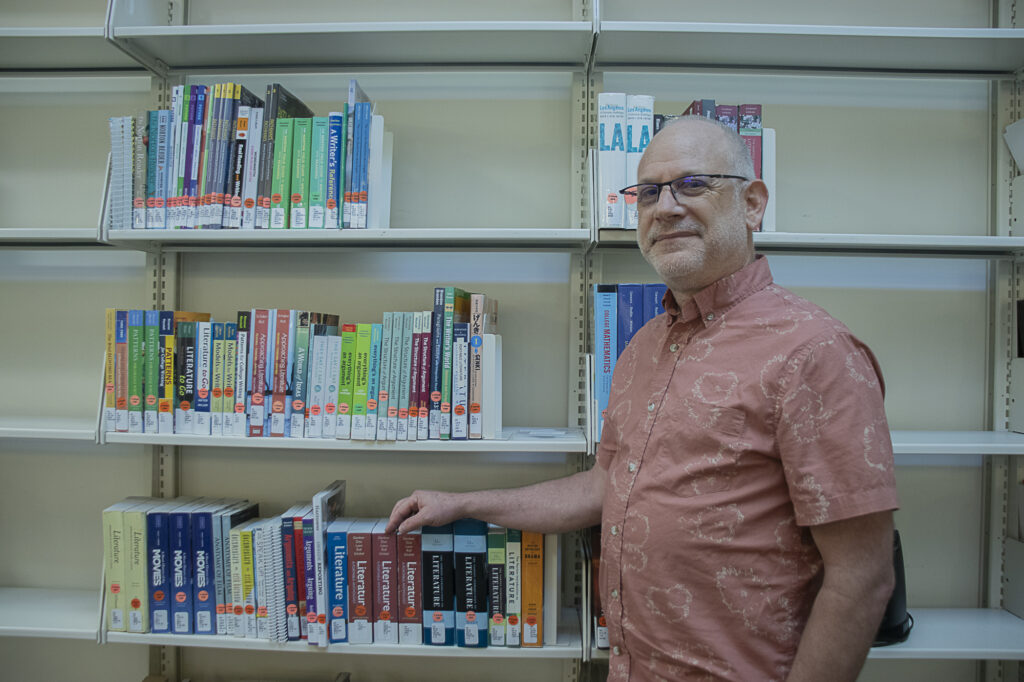Textbook expenses are often something college students fear having to deal with. Pierce College has had an increase in zero cost textbook options for classes, putting some students’ minds at ease.
Librarian and Open Education Resources Coordinator Clayton Gediman started at Pierce a decade ago, where he learned about the option of zero textbook cost classes, and began to introduce it to faculty.
“I did some advertising with faculty and I thought, ‘Hey, if you have questions, let me know and I’ll see what I can find out,’” Gediman said.“And now 10 years later, I’m just still doing it.”
Gediman added that suddenly about two, three years ago, the demand for classes without textbook costs really blew up. Distance learning spurred by the pandemic helped that too, because online, pretty much all the resources students are looking for are digital, according to Gediman.
Gediman shared that zero cost textbooks have not always been the best quality, but have grown in quality within the past several years.
“It wasn’t that great a few years ago,” Gediman said. “It’s gotten really good now, especially with California, putting a lot of money into textbook development. The state of California has put millions of dollars into it.”
Gediman continued to explain that zero textbook cost classes not only benefit students, but also faculty, according to Gediman. Students are able to benefit from the free books, but faculty are able to have more freedom when it comes to teaching a class using zero cost textbooks.
“It works for the students,” Gediman said.“For GE classes, buying a textbook for those, it seems a little bit like a waste of money because you’re never going to look at that book again. The licensing for these textbooks is usually pretty open, so they can mix it with other things. So they can create a textbook that works for them and not make a class that works for the textbook.”
Hannah Vigil, a sociology major at Pierce, explained that most of her classes use zero cost digital textbooks, and that the quality matches textbooks she would be purchasing.
“They tend to be in the Canvas shell,” Vigil said. “I think one of my classes has a textbook that I had to buy. It’s a lot easier and more beneficial to students because students aren’t able to buy them themselves.”
Dale Fields, a faculty member for the Physics and Planetary department, said they use zero cost textbooks because these resources help students who may not have access to an education due to costs. Not only does money play a factor in taking a course, but Fields also believes charging for a textbook causes a lack of diversity in classes.
“I want my community college students to be successful,” Fields said. “Cost is a barrier and cost makes it so that the community cannot actually access education, because every single step of this process, we lose some members and we get less diverse in the people that we’re working with.”.
When it comes to creating a lesson or finding a free textbook that fits with the class, Fields looks for a book that matches their lessons rather than making their lessons match a book.
“It’s not a matter of this textbook is going to be the focus, but rather this textbook is helpful, but it’s going to be an extra supplement.” Fields said. “This will actually help you out and give you a better overall idea. If you can, same thing with the free textbooks or any textbook from my perspective.”
Fields is used to the idea of using free information for the public, as most information from astronomers is made for public knowledge, not for monetary gain.
“If you’re a science astronomer, and you get a chance to use the Hubble Space Telescope or the James Webb Space Telescope to do a particular research program, you get that information, no one else can see it, but only for a year.” Fields said.. “It goes public and this information should be shared, because then now everyone can participate, so we’re already predisposed to try to make low or zero cost textbooks”.
Students are able to find which courses offer zero cost textbooks when selecting their course via the student portal.
